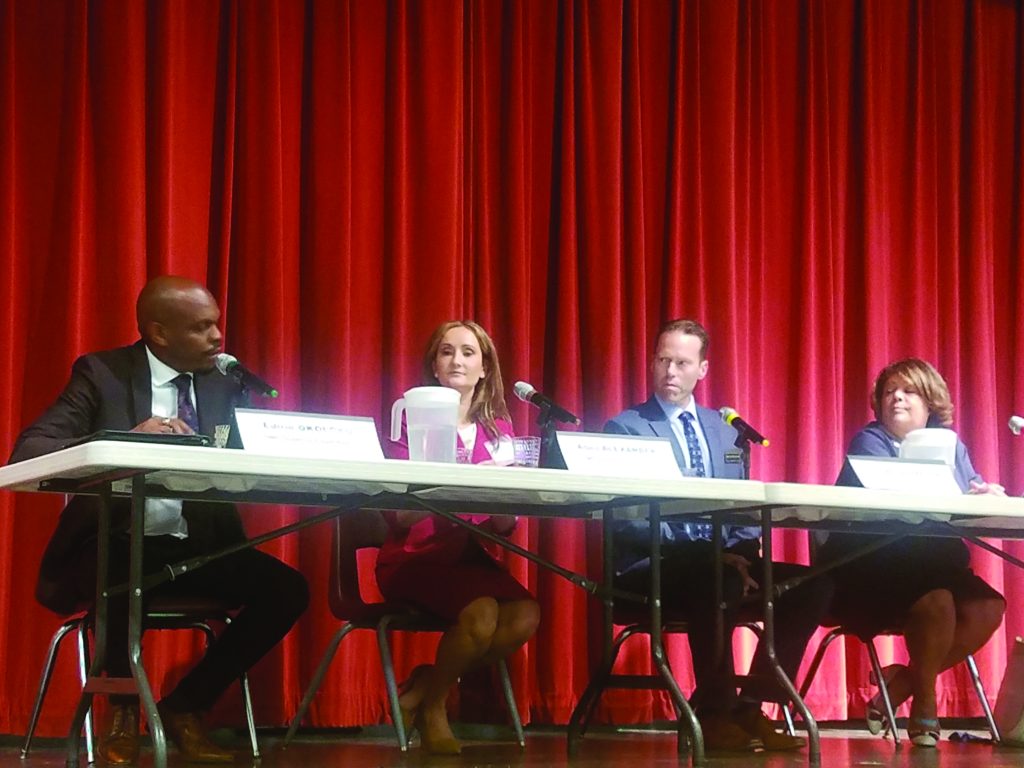by MARIO LOTMORE | Last Updated October 3, 2019
Approximately 100 people attended the Snohomish County Candidate Forum in the auditorium of Sultan High School in Sultan on Monday, September 30 from 7 PM to 9:30 PM. The League of Women Voters of Snohomish County Service Committee (LWVSC) hosted the event, which was moderated by Jody Trautwein, Voter Service Chair with the League of Women Voters of Snohomish County.
Each candidate was allotted one minute to respond, and each candidate also had the opportunity to use one challenge card. A challenge consisted of one candidate challenging another candidate’s point for up to 45 seconds and the other candidate getting a chance to respond.
Candidates for Sultan Mayor and City Council, Fire District 5, and for Snohomish County Auditor, Sheriff, Treasurer, and Superior Court Judges answered both predetermined and audience questions.
Because this was the only forum to host the judicial candidates for Snohomish County Superior Court, this article focused on that segment of the forum. Our recap of the next forum scheduled for Monday, October 7 from 6 PM to 8 PM at the Snohomish County campus located at Rockefeller Ave. in Everett, will focus on candidates for Snohomish County Council Positions 2 and 3, Auditor, Sheriff, and Treasurer.

Candidates for Superior Court Judge are incumbent Judge Edirin Okoloko against attorney Anna Alexander for position 7, and for position 14, incumbent Judge Paul Thompson against attorney Cassandra Lopez-Shaw.
Okoloko has lived in Edmonds for over 16 years, where he and his wife raised their two children. In 1998, Okoloko won and qualified for the Diversity Visa Lottery which allowed him to emigrate to the United States and eventually become a citizen. He has received various professional awards and in October of 2018, was appointed to Superior Court by Governor Jay Inslee. He is rated highly by various judicial societies including the Washington Women Lawyers and has bipartisan endorsements.
Alexander is also a first-generation immigrant but whose family escaped the Soviet Union when she was twelve years old. At 19, Alexander was the youngest woman admitted to the University of Washington School of Law. For the past twelve years, she has been running her own law office. Alexander is the President of the Snohomish County chapter of Washington Women Lawyers and is endorsed by various mayors throughout the county.
Thompson lives in Edmonds with his long-time partner, Whitney Rivera, also a respected Public Defender. When Governor Inslee sought to fill a vacant seat on the Snohomish County Superior Court in 2018, Thompson was rated by seven independent Bar groups, earning top ratings from his peers. Thompson community involvement includes serving as both President of the Washington Defender Association and a Board member of the Washington Association of Criminal Defense Lawyers. He is rated highly by various judicial societies including the Veterans Bar Association and has bipartisan endorsements.
Lopez-Shaw has 16 years as a trial attorney in both private firms and public organizations, litigating civil, family, and criminal trials at all levels of State Courts, Federal Court, and the Court of Appeals. She is rated Exceptionally Well Qualified by Veterans Bar Association and Loren Miller Bar Association. In 2019, Washington Women Lawyers recognized Lopez-Shaw for her work on behalf of victims of crime with the Domestic Violence Advocacy Award.
Question 1: What do think are some of the biggest issues facing the criminal justice systems in Snohomish County?
Both Okoloko and Thompson stated the limited tools to deal with the high number of drug and mental court cases. “We are dealing with issues that we are not designed to deal with limited tools,” said Thompson. Okoloko added, “[because of the] high cost of litigation, many litigants are self-representing which results in delays to resolve cases.”
Alexander is concerned with the number of judges retiring. Stating the risk of attrition may leave an experience gap in the court. Lopez-Shaw on the other hand stated the need for more interpreters to meet the needs of the changing demographic of the county. “We need to go into high schools and colleges to recruit students to be interpreters,” said Lopez-Shaw.
Question 2: How do you plan to promote access to justice by persons of modest or poverty level means or the homeless?
Okoloko stressed patience and fairness. “As a jurist you do this out of service and not out of ambition… Judges must recognize within themselves their own implicit biases which may stand in the way of allowing people access to justice.”
Alexander advocated for a change in the local rules to reduce litigation time. “Change the local rules to limit the amount of discovery litigation in civil cases such as in King County. Judges determine the local rules. This levels the playing field between deep pockets and regular people in family court.”
Lopez-Shaw shared her story of poverty before becoming an attorney and knowing what it feels and looks like for her clients. She stressed the importance of communication. “I do not speak legalese… In civil and family law people can’t afford lawyers, so when they come before you, they must know what you are saying.”
Thompson would like to see increase access of representation for civil matters. “We must ensure access to people of moderate means. A fair screening process, adequate and good representation.”
Question 3: What are your views on whether the court as a whole, deals effectively with racial and gender bias?
Both Lopez-Saw and Alexander shared their personal experience as women in the courtroom. “In trial this week I had an opposing council call me ‘the lady over there’ to the witness and I had to correct that council and instructed the court to have him refer to me as the defense council,” said Lopez-Shaw.
Alexander said, “My passion has been promoting gender equality and proper treatment of women litigants and women lawyers in the courtroom. This is one of the reasons I am running.”
Okoloko expressed the need for judges to not only recognize that bias exists but must recognize it within themselves. He added, “Justice is blind. We must look at people that come before us on the merit of their dispute and not the color of their skin or gender. We as judges inspire people and we need to set that standard in our court rooms.”
Thompson recognized that his gender and ethnicity may have afforded him some societal advantages that those who come before him in court may not have had. “I agree with my opponent we need to make progress. Everywhere in this state and nation these issues are front and center. We need to be aware and acknowledge them and we need to do something about it.”
When asked about addressing small town issues such as access to the county courthouse, all candidates stated they would like to see technological innovations ranging from e-filing of documents to video feeds for litigants at the local library as in Island County.
Final Question: How do you or would you balance mercy with justice in your court?
“Unless you have been down with a person or family who has chosen you as their lawyer in their time of need, looking up at that judge, you don’t have that perspective that is needed to make that balance true,” said Alexander.
“I was prosecuting cases of sexual and physical abuse against children, women and homicides and murders. I recognize what it is to have a family reaching out for justice and also as a prosecutor, to hear a family reaching out for mercy. In the criminal justice system, for the most part, our discretion is taken away by the sentencing guidelines but in those areas where we have discretion, we have to believe people can be rehabilitated. Mercy and justice are part of our role as judges,” said Okoloko.
Thompson expressed frustration with the current version of the mandatory sentencing scheme brought into effect in 1984. He stated the new version in two years will give judges more flexibility to address issues.
Lopez-Shaw analogized justice and mercy to that of being a parent. “I find myself being a parent more than a lawyer sometimes. The balance between mercy and justice is more like parenting. We know when we have to be firm and we know when we have to be disciplined because it is what is safe and in their best interests long-term.”
After the forum, the Lynnwood Times asked each candidate to share their judicial philosophy. Okoloko, said, “As judges we take an oath to uphold the constitution of the United States and the laws of the state of Washington; that is what I bring to the table and how I approach my role as a judge. Everyone that comes before me is treated fairly, with respect and dignity.”
Alexander would like to see more diversity of experience in the court. “Nine of the 15 [judges] come from the prosecutor or public defender background… [they] only have a criminal point of view.”
Thompson expressed to be fair and listen to everyone. “I read everything everyone has given me to be prepared as possible. I give everyone a forum to have their case heard.”
“To be disciplined and fair and set expectations to treat each other with respect,” said Lopez-Shaw.
Forum moderator, Jody Trautwein, was very pleased with the forum. “Turnout was great. Candidates were prepared and adhered to rules…everything went smoothly.”
Trautwein would like to extend a warm thank you to the students of Sultan High School for recording the event, Sky Valley Chamber of Commerce, and the Sno-Isle Library at Sultan.
To watch the forum in its entirety, visit https://www.turkpride.tv/.
Below are links to candidate websites:
Judge Edirin Okoloko – https://www.judgeokoloko.com/
Anna Alexander – https://www.alexanderforjudge.com/
Judge Paul Thompson – https://www.judgepaulthompson.com/
Cassandra Lopez-Shaw – https://www.cassandrashawforjudge.com/
Author: Mario Lotmore












